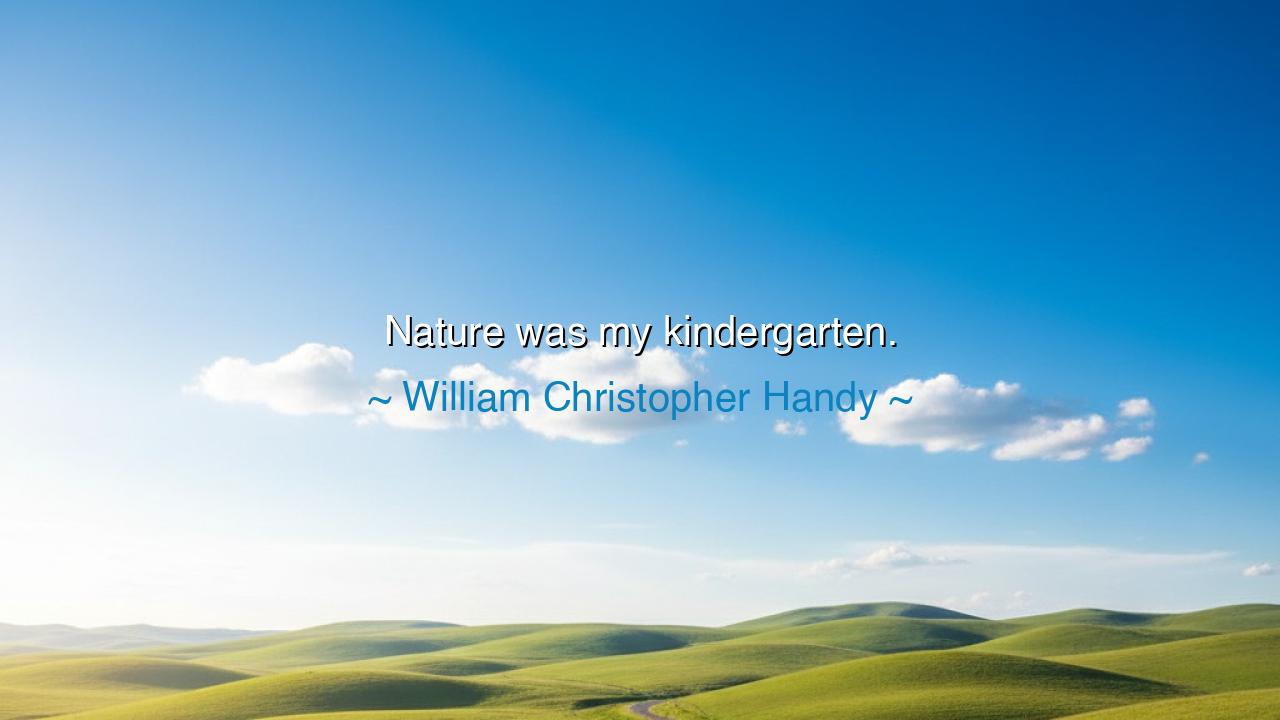
Nature was my kindergarten.






William Christopher Handy, the Father of the Blues, once said with poetic simplicity: “Nature was my kindergarten.” These words are more than a remembrance of childhood; they are a declaration of how the world itself can be the first and greatest school. To call nature one’s kindergarten is to confess that before the walls of classrooms, before the guidance of books and teachers, it was the rivers, the trees, the birds, and the winds that first shaped his soul.
O listener, see the beauty of this truth: nature itself is the earliest instructor of all mankind. The rising sun teaches hope and renewal, the seasons teach change and impermanence, the flowing river teaches perseverance, and the stillness of the night teaches reflection. For Handy, who grew up in the South, the sounds of nature—the calls of birds, the hum of insects, the rhythm of wind through leaves—were more than background; they were lessons in harmony, rhythm, and music itself. From such surroundings, the seeds of the blues were sown in his spirit.
Consider how this echoes the lives of many great souls. Abraham Lincoln, born in a log cabin, once said his schooling was “defective,” but he learned deeply from the forests and the soil. He was instructed not only by men but by the vastness of sky and field, which taught him endurance, humility, and the strength to grow from nothing. So too did the poet Wordsworth declare that nature was the greatest of teachers, shaping his spirit into one that could see the divine in the simplest flower or the humblest stream.
In Handy’s words there is also the voice of one who understood that formal schooling may fail to give all that is needed, but nature never fails to instruct. In an age when opportunity was scarce, and when prejudice denied him many doors, the open world became his classroom. The sounds of field hollers, the rhythm of labor in cotton fields, the cries of men and women bound by hardship—these too became his kindergarten, teaching him how suffering could be transformed into song, how lament could become beauty.
The lesson is not merely historical, but eternal: each of us, whether rich or poor, educated or not, may learn from the great teacher that is the natural world. We need not wait for classrooms to open or books to arrive. Step outside, and the wind will instruct you in freedom; the rain will teach you renewal; the stars will whisper eternity. All who listen to nature’s lessons will find that wisdom flows in abundance to the attentive soul.
Thus the meaning of Handy’s words is both humble and heroic: greatness does not depend upon the wealth of schools, but upon the willingness to learn from what is already before us. To say “nature was my kindergarten” is to testify that the world itself, in its beauty and sorrow, is the first school of every human heart.
Therefore, children of tomorrow, take this wisdom into your own lives. Do not despise simple beginnings, nor think yourself poor if denied fine halls of learning. Let nature be your kindergarten as it was Handy’s. Walk with open eyes and ears; hear the music in the world around you; let the earth and sky become your teachers. From such beginnings may rise not only knowledge, but wisdom, strength, and song.
For in the end, Handy’s testimony reminds us that the truest education is not confined by walls. It begins where life itself begins—in the soil, in the sound, in the breath of nature—and it is there that we discover both our voice and our destiny.






AAdministratorAdministrator
Welcome, honored guests. Please leave a comment, we will respond soon